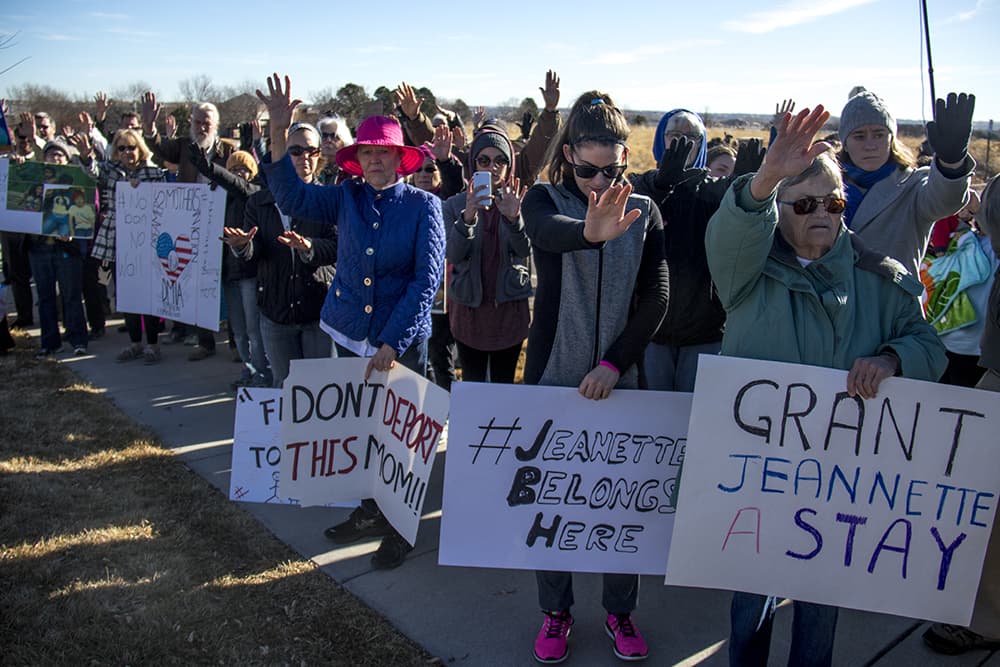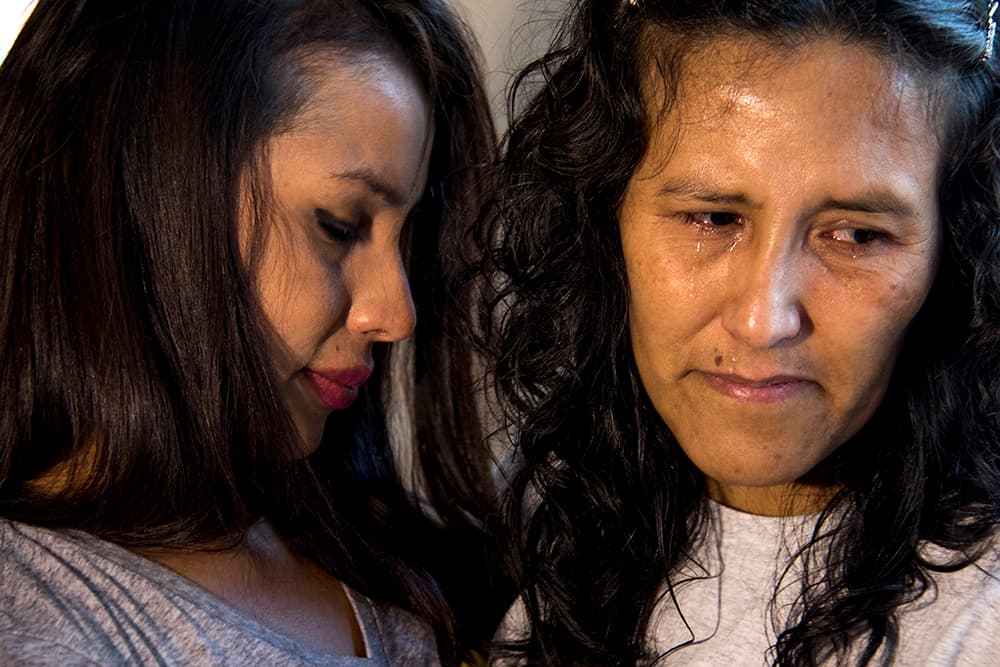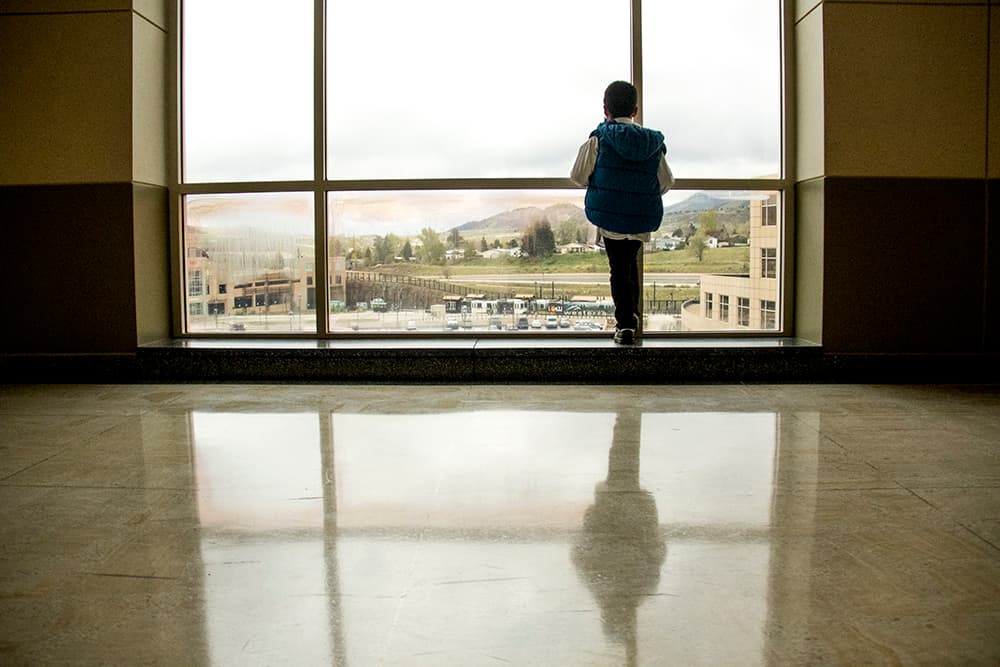
Kensy Serrano went to her check-ins with Immigration and Customs Enforcement twice a year for three years without incident, but in April, the Aurora mother of five U.S. citizen children was detained. Two months later, she is still behind bars even though a judge has already granted her permission to re-open and contest her original deportation order.
The hardest part for her husband, Alfredo Macias, has been explaining the situation to their children, who range in age from 15 to 3.
"They start to wonder why people do that. They don't trust anymore," he said. "What can you tell them? It's hard because you have anger, too. You tell them, 'It's in God's hands.'"
Immigration law is complex, and every case is different. But immigration attorneys increasingly report that clients who have been granted stays of removal and ongoing supervision -- people like Serrano -- are now being denied those stays and instead are being taken into custody when they report for their regular check-ins. At the same time, not going to these appointments would also mark someone for deportation.
"What's happening now is ICE is denying these requests days before the appointment or at the appointment," said Nicole Murad, an immigration attorney who is representing Serrano. "I can't tell people not to go to these appointments. I have to advise them of the consequences."

"We are in a different world than under Obama," Murad added. "People are facing this lack of discretion."
That's what happened to Maria de Jesus Jimenez-Sanchez, another Aurora woman with U.S. citizen children. Her advocates and U.S. Rep. Mike Coffman all identified her detention as part of a policy shift by Immigration and Customs Enforcement. Immigrants who previously were considered a low priority for deportation and allowed to remain in the United States provided they stayed out of any new trouble are now being detained and deported because they meet various technical criteria. Jimenez-Sanchez was ultimately deported to Mexico despite public attention on her case and her young children.
Under a February 2017 memo on enforcement priorities (read it here) from Department of Homeland Security Secretary John Kelly, the federal government will no longer exempt any category of "removable alien" from deportation, and people who have been convicted of any criminal offense, even a misdemeanor; people who have been charged with crimes, even if they haven't been convicted; and people who have outstanding deportation orders are all now considered priorities for removal.
Jeanette Vizguerra also expected to be detained at a regular ICE check-in, which was why she took sanctuary in a series of Denver churches. Vizguerra was recently granted a two-year stay of deportation, as was Arturo Garcia. Vizguerra and Garcia both have very high-profile cases that have attracted significant media attention and the individual intervention of Colorado congressmen. Vizguerra was recently named one of TIME magazine's 100 most influential people. But many other immigrants outside the spotlight have been detained and then deported when they show up at check-ins.
Julie Gonzalez, policy director at the Meyer Law Office, which represents Vizguerra, said the situation presents a real challenge for immigrants and their attorneys, and people who have received stays in the past need to go to their check-ins with "their eyes open."
"There has been a drastic shift in Colorado in terms of these final orders, regardless of individual circumstances, regardless of community support, regardless even of congressional support," she said. "ICE's mandate has been abundantly clear. They are trying to deport as many human beings as possible."
Gonzalez put the ultimate responsibility on Congress for failing to adopt immigration reform that gives people a way to legalize their status and doesn't make minor crimes deportable offenses.
"ICE will say they are just doing their jobs, and that's because Congress has not stood up and said, 'This is wrong,'" she said.
An ICE spokesman declined to answer a direct question about why Serrano was considered a priority for deportation or whether the policy around check-ins has changed.
Gregory Palmore responded instead with the bare facts of Serrano's case: "On April 5, 2017, deportation officers with Denver Field Office of U.S. Immigration and Customs Enforcement’s (ICE) Enforcement and Removal Operations (ERO) re-arrested Kensy Serrano-Del Cid, 34, after her order of supervision had been revoked. An immigration judge, in February 2010, ordered Del Cid removed from the United States. At the time she was arrested and was later placed on an order of supervision in June 2013."

Murad believes that Serrano can make a strong case for remaining in the country.
On Friday, Serrano has a bond hearing at which Murad hopes to get Serrano out of detention and back with her family while she contests her old deportation order. That order may have been based on some paperwork mistakes and bad information, Murad said. Serrano didn't even know about it at the time and never had a chance to argue her case.
Serrano previously had something called Temporary Protected Status. This status gives work authorization and permission to remain in the country to people whose countries of original are in states of turmoil due to civil war, natural disasters or other serious problems. Hondurans are eligible for TPS, as are people from El Salvador, Yemen, Syria, Nepal and Haiti, among others.
She has a misdemeanor shoplifting conviction in California from 2005, and she also misfiled some paperwork around that same time, accidentally asking for asylum instead of an extension of her TPS designation. She was denied future TPS requests, and in 2010, ICE ordered her deported.

But according to Murad, her attorney, and Macias, her husband, Serrano didn't even know. Serrano and Macias had moved from Los Angeles, where they lived for many years and where they met, to Colorado in search of better economic opportunities and a different lifestyle for their family. Macias said Serrano informed ICE of her change of address, as required, but she was never notified of her deportation proceeding. She had no opportunity to present new information or argue her case.
This all came to light in 2014, when one of their children was bit by a family dog that wasn't registered. Serrano got a ticket but forgot about the court date. According to Macias, when they were stopped for a broken taillight on their way back from a water park, Serrano was arrested on the warrant for failure to appear on the dog registration violation. In less than an hour, immigration authorities had placed a hold on Serrano.
But Barack Obama was still president then. Serrano received a stay of deportation and was released on supervision, meaning she could carry on with her normal life as long as she checked in every six months.
That normal life revolves around their five children, Macias said, including volunteering in their schools.
"We have five children because we love children," Macias said. "We just want to do the best we can for them, teaching them our values and our culture, respect for others, always lending a hand where you can."
Macias works in construction, not a job with tons of flexibility, and while he has some family in the area, they aren't in a position to provide the kind of attention his wife could provide to the children and their home life. Little things like doctor's appointments now require a major scramble, and he's had to ask his 15-year-old son to step up at home. His son, meanwhile, misses his mom.
"It's tough on him because he and my wife would talk like best friends every day," he said. "I had more the role of telling him to do this or that, and she was more understanding."
Macias said Serrano has faith that she'll ultimately prevail and avoid deportation to Honduras, where family members have been murdered in the ongoing gang violence that plagues the country. But it's been "devastating" for her to be away from her children, and the experience has deeply shaken her faith in the system.

Macias said he wishes ICE would take into consideration the impacts on families when it detains people.
"I don't know if they don't understand or don't care about the impact it has on a child," he said. "They aren't self-sufficient. They detain the parent, and God help the child. ... They don't understand that we're humans."
This story has been updated to include a response from ICE.










